About the project
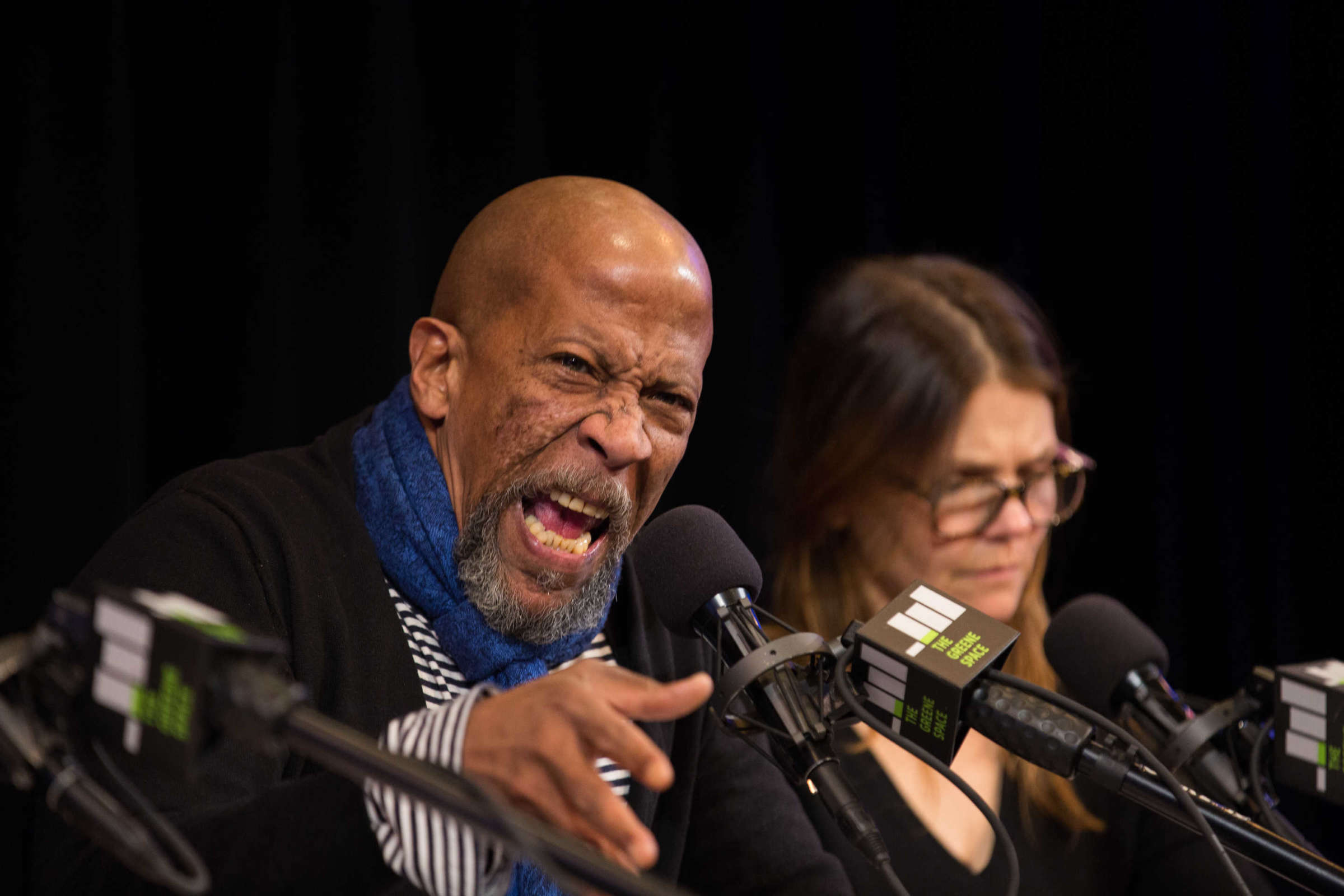
Theater of War
Dramatic Reading of Ajax + Philoctetes, by Sophocles
Translated and Directed by Bryan Doerries
It has been suggested that ancient Greek drama was a form of storytelling, communal therapy, and ritual reintegration for combat veterans by combat veterans. Sophocles himself was a general. At the time Aeschylus wrote and produced his famous Oresteia, Athens was at war on six fronts. The audiences for whom these plays were performed were undoubtedly composed of citizen-soldiers. Also, the performers themselves were most likely veterans or cadets. Seen through this lens, ancient Greek drama appears to have been an elaborate ritual aimed at helping combat veterans return to civilian life after deployments during a century that saw 80 years of war.
Theater of War presents readings of Sophocles’ Ajax and Philoctetes to military and civilian communities across the world. These ancient plays timelessly and universally depict the visible and invisible wounds of war. Each performance is followed by a powerful audience discussion led by community panelists. This project has been presented for diverse audiences in a wide array of settings, including military installations, hospitals, medical schools, universities, homeless shelters, libraries, public housing developments, cultural institutions, high schools, prisons, and public parks.
I think Sophocles’ wrote these plays to comfort the afflicted and to afflict the comfortable

About the plays
-
Ajax by Sophocles
Sophocles’ Ajax tells the story of a fierce warrior who is passed over for recognition by his command after losing his cousin Achilles in battle during the Trojan War. Feeling betrayed, Ajax attempts to murder his superior officers, fails, and—ultimately—takes his own life. The play tells the story of the events leading up to Ajax’ suicide, as well as the story of his wife and troops’ attempt to intervene before it's too late. The play also depicts the devastating impact of Ajax’ suicide upon his wife, son, brother, troops, and chain of command.
-
Philoctetes by Sophocles
Sophocles’ Philoctetes tells the story of decorated warrior who is abandoned on a deserted island because of mysterious chronic illness that he contracts on the way to the Trojan War. Nine years later, the Greeks learn from an oracle that in order to win the war they must rescue him from the island. When they finally come for him, the wounded warrior must overcome nine long years of festering resentment and shame in order to accept help from the very men who betrayed him.
Theater of War Highlights

Audience of Theater of War: Ajax
United States Naval Academy / 2023
We were honored to present three projects—Theater of War: Ajax, Rum and Vodka, and Tape—in Alumni Hall at the United Naval Academy on October 13th and 14th. Our thanks go the thousands of Midshipmen who participated and offered their keen insights into the plays, engaging in powerful discussions about mental health, suicide prevention, alcohol/substance abuse, addiction, consent, and power dynamics.Our thanks go the thousands of Midshipmen who participated and offered their keen insights into the plays, engaging in powerful discussions about mental health, suicide prevention, alcohol/substance abuse, addiction, consent, and power dynamics.

Audience member participates in Theater of War: Ajax
United States Naval Academy / 2023
Keith David Plays Ajax
2023
This special presentation was co-presented by Theater of War Productions, Humana, Reveille Grounds, VFW (Veterans of Foreign Wars), and DAV (Disabled American Veterans), as part of Global Loneliness Awareness Week.
This event took place on June 12, 2023 and featured performances by Taylor Schilling (Orange is the New Black, Dear Edward), Keith David (Platoon, Armageddon, Nope), Naomi Mathis (Air Force Veteran, DAV Associate National Legislative Director), Dan West (Adjutant General, Veterans of Foreign Wars of the United States; Marine Veteran), and David Hanauer (Ensemble Manager of Olive Branch & Laurel Crown, Marine Veteran).
Theater of War Philoctetes
on Zoom / 2023
Watch the full recording Theater of War: Philoctetes featuring Willem Dafoe, Jason Isaacs, Nyasha Hatendi and a chorus of Veterans. This event was co-presented by Bravehound, a Scottish charity that supports former servicemen, women and their families by providing service dogs and training to Veterans.
Theater of War Trailer
2020
Watch the Theater of War Trailer
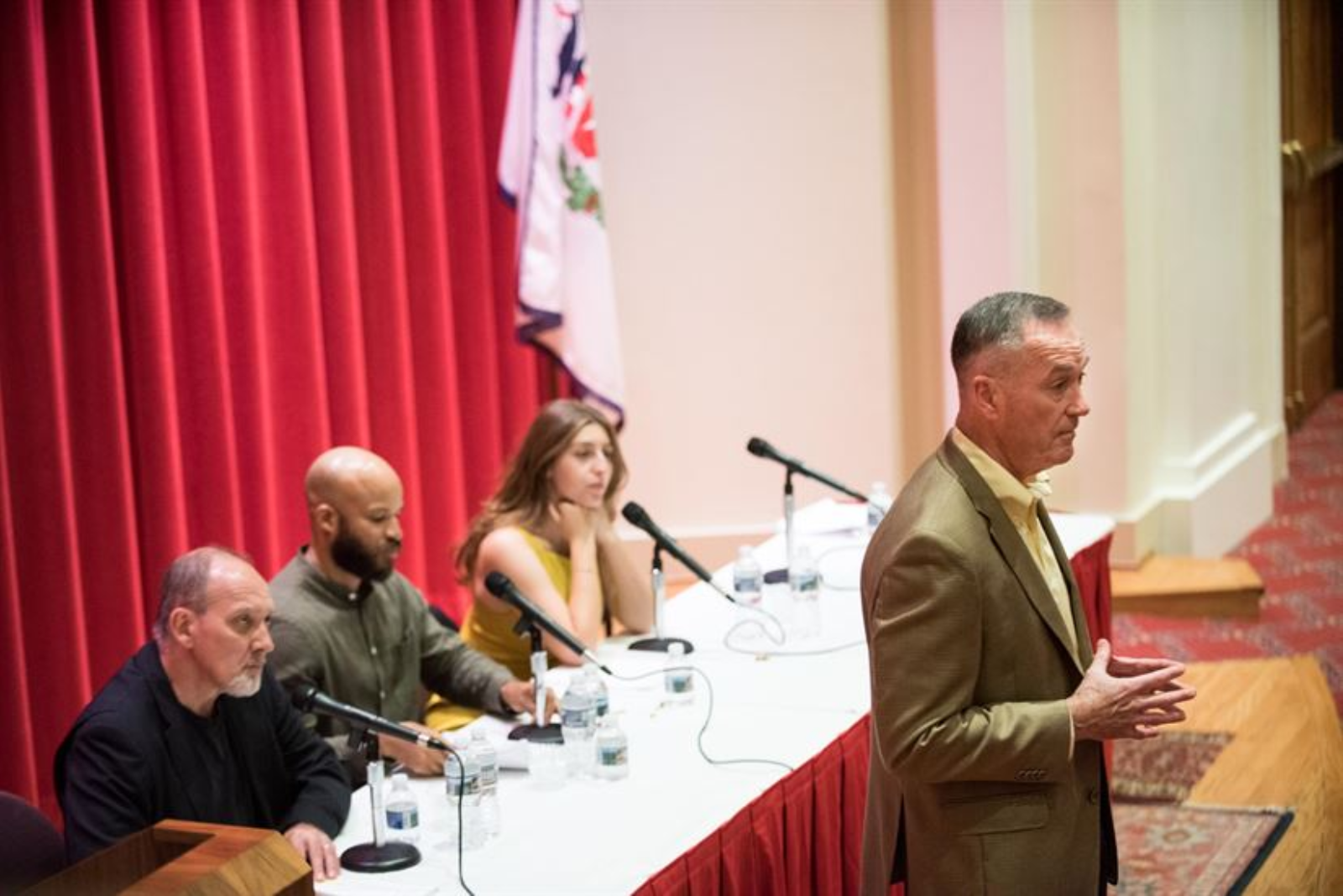
Chairman of the Joint Chiefs of Staff Gen. Joseph Dunford presents Theater of War to Joint Chiefs and Combatant Commanders
National Defense University, Fort McNair, Washington, DC / 2017
Zach Grenier, Glenn Davis, and Marjolaine Goldsmith are introduced by the Chairman of the Joint Chiefs of Staff Gen. Joseph Dunford. See article.
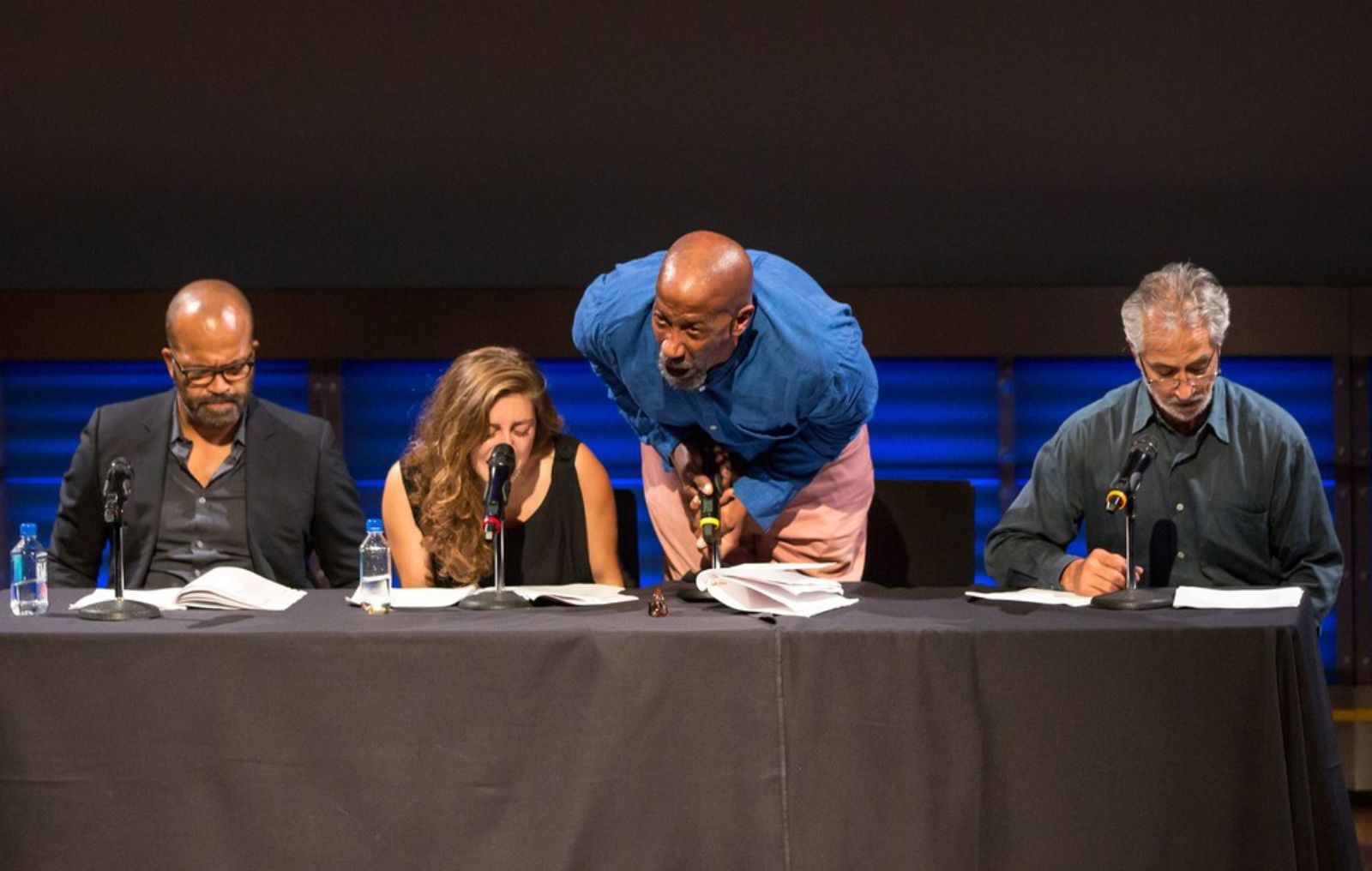
Reading of Scenes from Sophocles’ AJAX
National Geographic Society, Washington, DC / 2016
Jeffrey Wright, Marjolaine Goldsmith, Reg E. Cathey, and David Strathairn present Theater of War on the fifteenth anniversary of the Sept 11 attacks. This performance was featured in The New Yorker.
Theater of War on PBS Newshour
2011

Like War Itself, Effects of War Are Hell. Ask the Greeks.
The New York Times / 2008
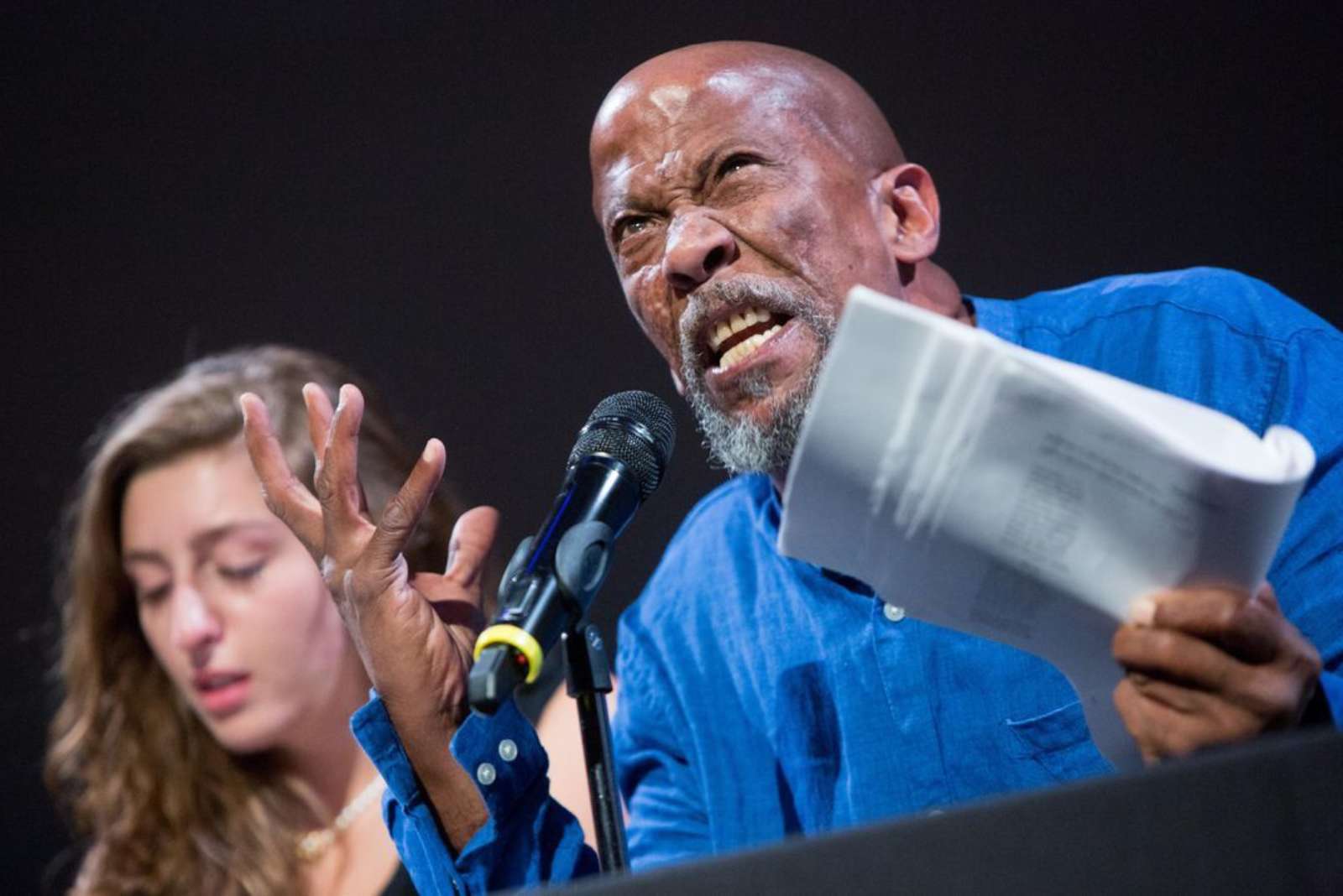
The Healing Power of Greek Tragedy
Smithsonian Magazine / 2017
Theater of War: Battling PTSD with Sophocles
The Aspen Institute, Scholastic Auditorium, NY / 2016
Reg E. Cathey, Kathryn Erbe, and Michael Stuhlbarg perform Sophocles' Philoctetes, followed by a conversation with the audience, Bryan Doerries and Maurice Decaul.
Theater of War, the origin story by Bryan Doerries
Chautauqua Institution / 2016

In Ancient Dramas, Vital Words For Today's Warriors
NPR / 2008
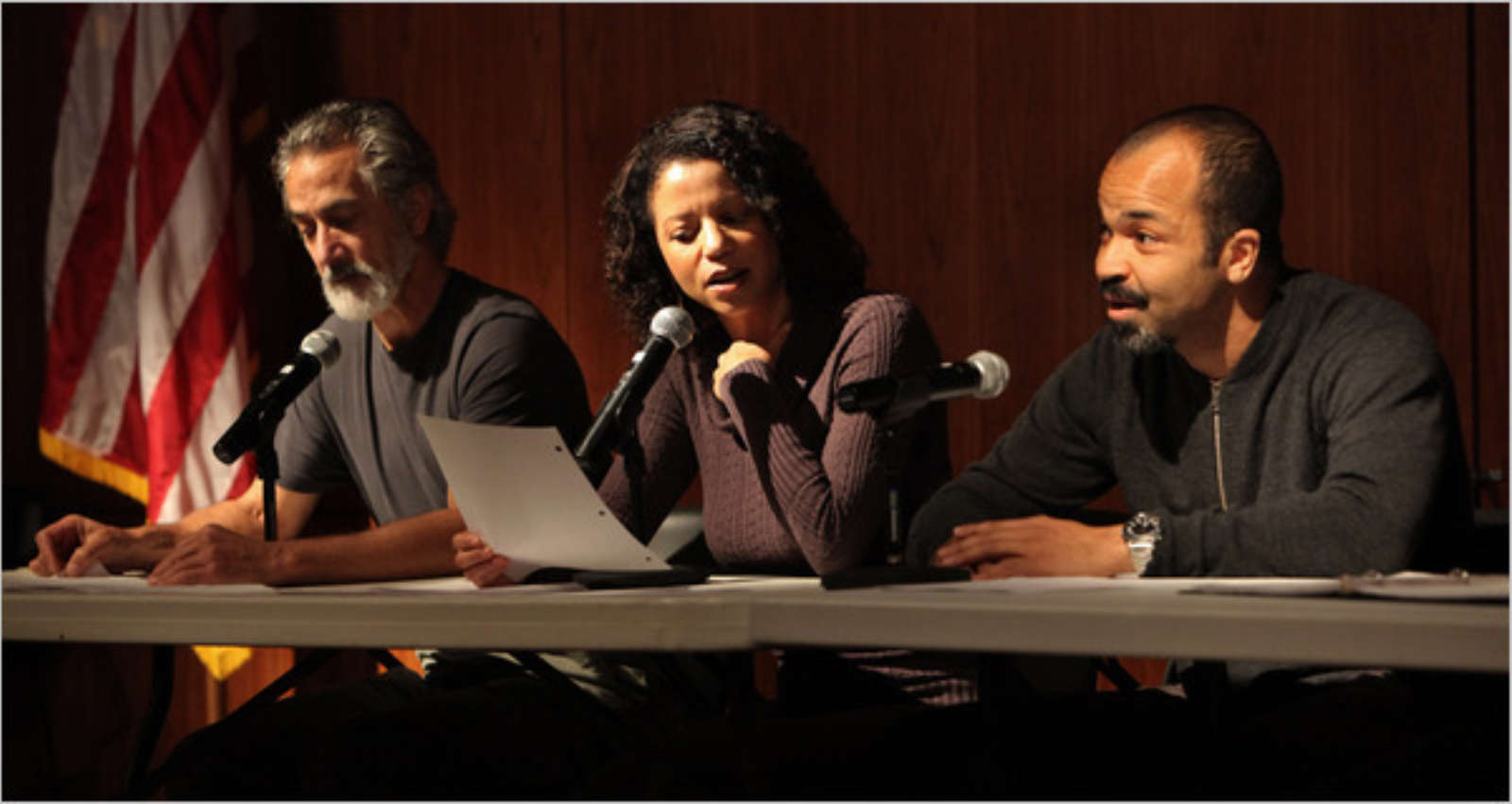
The Anguish of War for Today’s Soldiers, Explored by Sophocles
The New York Times / 2009
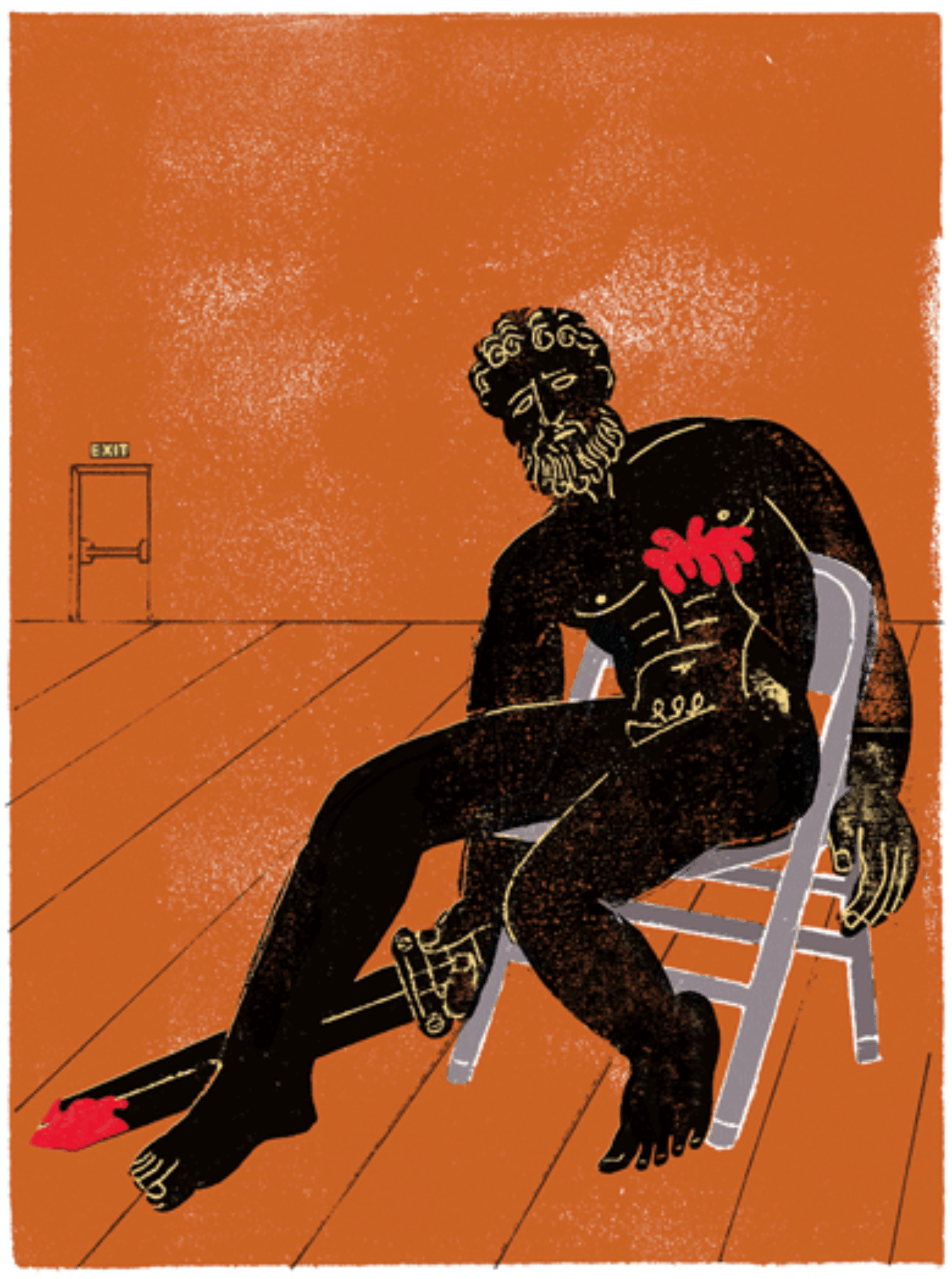
You Are Not Alone Across Time Using Sophocles to treat PTSD
Harpers Magazine / 2014
Harpers Magazine profiles Theater of War. Read the article.
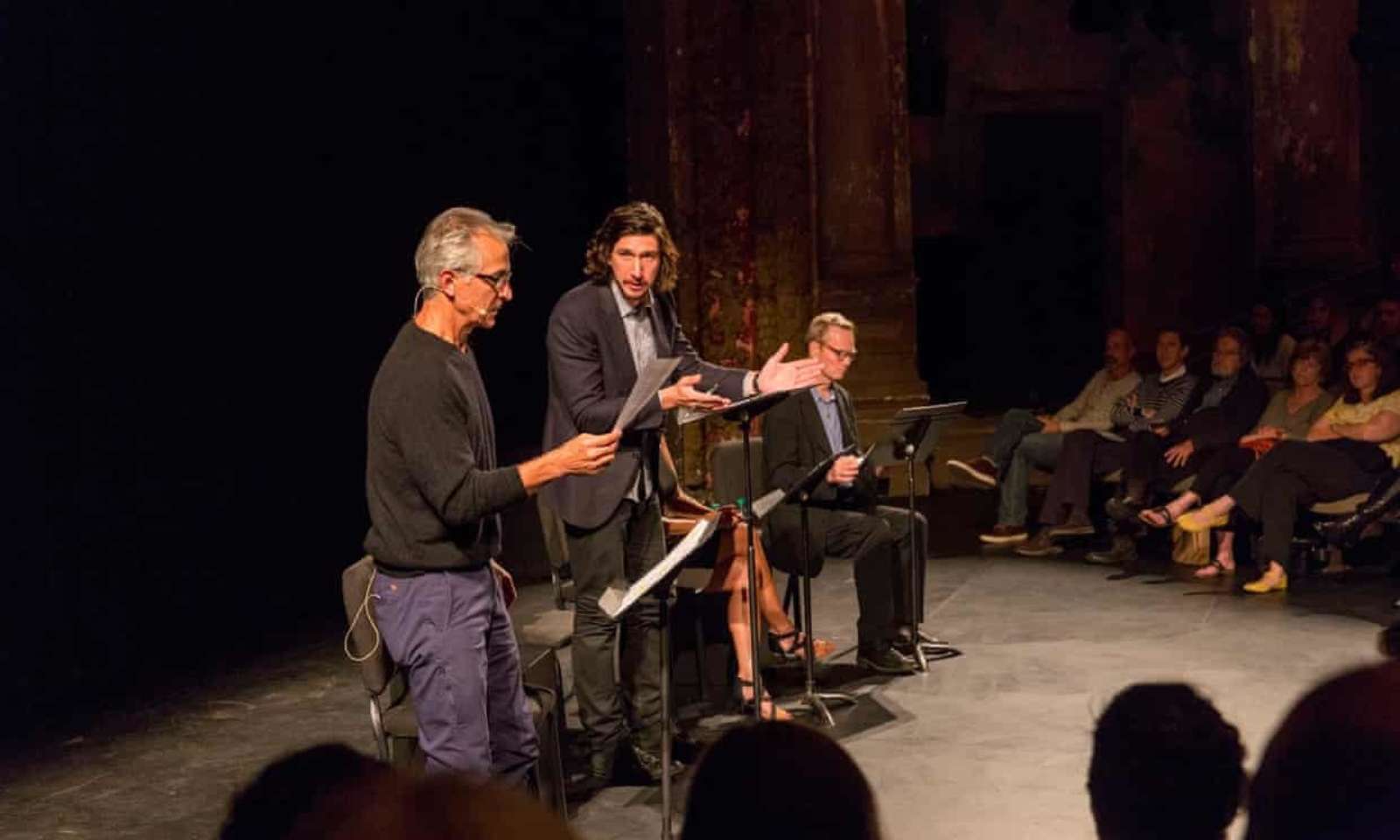
Sophocles and awe: the director hitting war vets with Greek tragedy
The Guardian / 2015

Theater of War Productions presents Sophocles’ ‘Ajax’ at Miller Theatre, wrestles with impact of war through dialogue across campus and across time
Columbia University / 2019
Theater of War Productions collaborated with Columbia University in honor of the 100th anniversary of the Core Curriculum. We presented Ajax to an audience comprised of Columbia Students and New York City Veterans struggling with homelessness and addiction to contextualize and interrogate the text that has been taught for 100 years. Read about the performance in the Columbia Spectator
Explore Projects
-
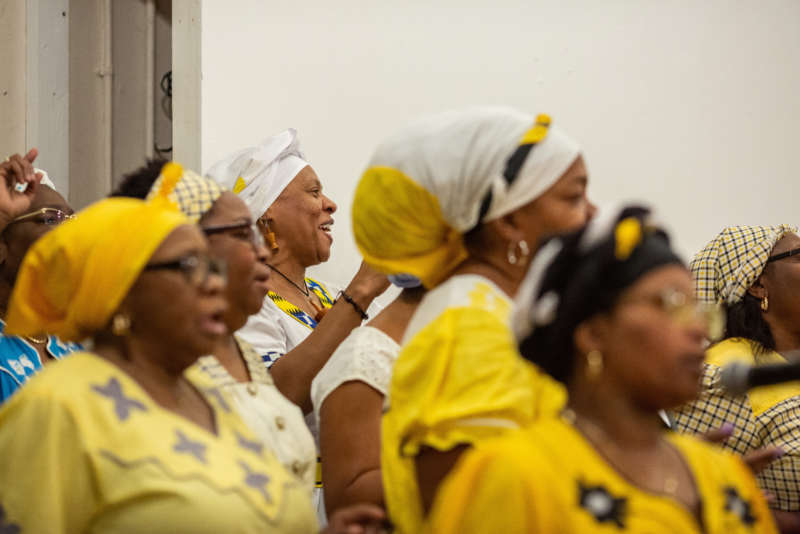 Refugees & ImmigrationThe Suppliants Project
Refugees & ImmigrationThe Suppliants ProjectThe Suppliants Project tells the timeless story of fifty female refugees seeking asylum at a border from forced marriage and domestic violence. The play not only depicts the struggle of these women to cross into safety, but also the internal struggle within the city that ultimately receives them. Using a 2,500-year-old tragedy by Aeschylus as a catalyst for powerful gatherings and crucial conversations, The Suppliants Project engages diverse audiences in humanizing, constructive dialogue about the challenges and impact of war, migration, and seeking asylum.
-
 Racialized Police ViolenceAntigone in Ferguson
Racialized Police ViolenceAntigone in FergusonAntigone in Ferguson is a groundbreaking project that fuses dramatic readings by acclaimed actors of Sophocles’ Antigone with live choral music performed by a diverse choir, including activists, youth, teachers, police officers, and concerned citizens from St. Louis, Missouri and New York City, culminating in powerful, healing discussions about racialized violence, police brutality, systemic oppression, gender-based violence, health inequality, and social justice. Antigone in Ferguson was conceived in the wake of Michael Brown’s death in 2014, through a collaboration between Theater of War Productions and community members from Ferguson, MO, and premiered at Normandy High School, Michael Brown’s alma mater, in September of 2016.
-
 Domestic ViolencePatient and Impatient Griselda
Domestic ViolencePatient and Impatient GriseldaTheater of War Productions and Margaret Atwood return to the Toronto International Festival of Authors with an exciting new collaboration exploring power and control, domestic violence, and family dynamics by way of two versions of the same story, one written by Giovanni Boccaccio in 1348 during the bubonic plague and the other by Atwood in 2020 during the Covid-19 pandemic. In Bocaccio’s version, a woman named Griselda remains in an abusive and controlling relationship, showing great patience and forbearance in the face of her husband’s sadism and cruelty. In Atwood’s version, Griselda takes matters in her own hands and, with the help of her sister, turns the tables on her husband.
This free, public event featured a live, dramatic reading of the “Patient Griselda” story from Boccaccio's Decameron by Jesse Eisenberg (The Social Network, Fleishman is in Trouble), Maev Beaty (Beau is Afraid, Mouthpiece), and Araya Mengesha (Tiny Pretty Things, Nobody). Then, in response, Margaret Atwood performed “Impatient Grisleda,” a story that is narrated to a group of humans in quarantine by an alien that looks like an octopus. The readings of both texts was followed by immediate responses by community panelists and culminated in a guided audience discussion, facilitated by Bryan Doerries (Artistic Director, Theater of War Productions).
Co-presented by Theater of War Productions and Toronto International Festival of Authors.
This hybrid presentation took place in person at the Toronto Harbourfront Centre Theatre and on Zoom Webinar on September 30, 2023.















